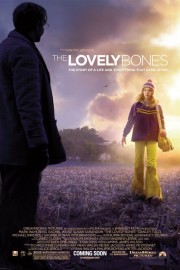The Lovely Bones
This is as good an adaptation as I think we could hope for from Alice Sebold’s novel. The novel is a heartbreaking and haunting chronicle of a family’s love, loss, and renewal after the 14 year-old Susie Salmon is raped and murdered by neighbor George Harvey. The film, adapted by Peter Jackson and his co-screenwriters Fran Walsh and Philippa Boyens, leaves a lot of the story’s depth on the cutting room floor by focusing on the Salmon family’s dealing with Susie’s loss.
Watching the film, a little piece of me died contemplating the review if Roger Ebert, who called it “a deplorable film” and criticized its’ handling of the subject. He’s certainly entitled to his opinion, and he’s certainly earned the right to do so, but did he watch the same film I did? Jackson may not be able to accomplish everything Sebold did in her (and yes, simplified some of the novel’s richest relationships too much), but the spirit of her work is intact.
What spirit is that? Sebold’s story is an emotionally-rich journey of acceptance, of moving on, and finding the unexpected in life, sometimes even when things are at their worst. Starting with a sonically-rich and musically emotional score by Brian Eno (whose visionary work in the ’70s- when the story is set- was influential to Jackson as he was making the film; when he got a hold of the composer to ask to use some of his pieces in the film, Eno unexpectedly offered to score, and his work is among the best I’ve heard from the past year), “The Lovely Bones” rearranges the structure of Sebold’s story but not the heart of it, which is Susie’s observations of her life before her death, and her pain at seeing her family regroup and split apart, and the darkness of knowing her killer was still out there.
Susie’s first-person narrative, much like it is in the book, provides the emotional framework of the film. She finds herself in the “in-between,” still emotionally involved in Earthly matters too much to be truly at peace. Yes, there are moments of playfulness and overall silliness, but considering that it is Susie’s vision of the afterlife (and let’s face it, she’s still a 14 year-old girl), I can see where Jackson and his typically-superb visual effects team are coming from. Jackson, Boyens, and Walsh’s script provides her with beautiful and painful observations; the young Saoirse Ronan (an Oscar nominee for 2007’s “Atonement”) provides those words with a haunted voice and soul that becomes poetry that equals the visuals of Jackson and music of Eno.
If Ronan is the film’s centerpiece in terms of performers, Jackson surrounds her with a sterling (and sometimes surprising) supporting cast. As Susie’s distraught parents, Mark Wahlberg and Rachel Weisz are effective at conveying the warmth and later heartbreak that permeates through the Salmon family before and after Susie’s death. As her siblings, Rose McIver (as the inquisitive and blossoming Lindsey, whose emotional transformation into the woman Susie could never be is glossed over here) and Christian Thomas Ashdale (as the young Buckley) aren’t given enough of the archs that Sebold wrote for them on the page- one of the most painful cuts in the transition from page to screen, while Susan Sarandon brings her grandmother to wacky and scene-stealing life while not really being allowed the chance to develop the character fully. (Again, this is a very flawed adaptation, but probably the best one could do in turning the book into a film.)
But the performance you’ll likely remember most is Stanley Tucci as Mr. Harvey. Like in the book, it’s through Susie’s words and observations that we capture a glimpse into this dangerously isolated man’s pathology. Yes, his assault on Susie is blunted when compared to the book’s unnerving opening chapter, but in Tucci’s uncompromised performance, you see the monster beneath the man. And as he begins to set his eyes on Lindsey (and especially in the gut-wrenching scene where she breaks into his house), we see that his evil is unending, and the kind that leaves scars that make peace difficult for both the living and the dead. Yes, the film- like the book- pushes on towards the more hopeful peace, but Jackson brings the darkness of this subject to life with all his senses clicking. I won’t soon forget his powerful vision of Sebold’s lovely book. I’d be surprised if anyone else does as well.










